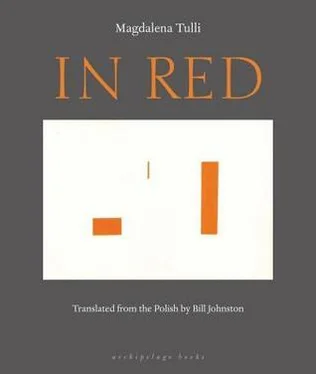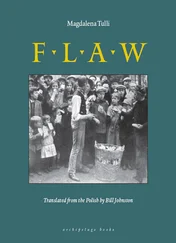Magdalena Tulli - In Red
Здесь есть возможность читать онлайн «Magdalena Tulli - In Red» весь текст электронной книги совершенно бесплатно (целиком полную версию без сокращений). В некоторых случаях можно слушать аудио, скачать через торрент в формате fb2 и присутствует краткое содержание. Год выпуска: 2011, Издательство: Archipelago Books, Жанр: Современная проза, на английском языке. Описание произведения, (предисловие) а так же отзывы посетителей доступны на портале библиотеки ЛибКат.
- Название:In Red
- Автор:
- Издательство:Archipelago Books
- Жанр:
- Год:2011
- ISBN:нет данных
- Рейтинг книги:3 / 5. Голосов: 1
-
Избранное:Добавить в избранное
- Отзывы:
-
Ваша оценка:
- 60
- 1
- 2
- 3
- 4
- 5
In Red: краткое содержание, описание и аннотация
Предлагаем к чтению аннотацию, описание, краткое содержание или предисловие (зависит от того, что написал сам автор книги «In Red»). Если вы не нашли необходимую информацию о книге — напишите в комментариях, мы постараемся отыскать её.
In this inventive novel, Magdalena Tulli creates a world that is unreal, yet strangely familiar and utterly convincing. Set in a mythical fourth partition of Poland,
is full of haunting descriptions of the town and its inhabitants; its power lies in Tulli's evocative, almost hallucinatory use of language.
In Red — читать онлайн бесплатно полную книгу (весь текст) целиком
Ниже представлен текст книги, разбитый по страницам. Система сохранения места последней прочитанной страницы, позволяет с удобством читать онлайн бесплатно книгу «In Red», без необходимости каждый раз заново искать на чём Вы остановились. Поставьте закладку, и сможете в любой момент перейти на страницу, на которой закончили чтение.
Интервал:
Закладка:
The proprietor of the hotel, perspiring and pale, had to ask whether Natalie Zugoff had really died in Buenos Aires.
“Oh no, she never come Buenos Aires. Prince long for her. Prince bury his longing.”
The photographer was in a hurry. He was immediately given access to Natalie Zugoff’s room, where, attended by the hotel staff, he set up his tripod and mounted on it a box with a glass lens that protruded like Prince Belorukov-Mukhin’s one eye. The shutter snapped over and again, preserving on negatives, from every possible angle, the bed piled with gowns.
“Prince, he love detail,” explained the photographer. Then he disappeared into the theater dressing room, amid still lifes of dried roses, tubs of powder, and tubes of lipstick. He concluded his work by taking pictures of the streets of Stitchings. Narrow and rather dark, they required long exposures. On the negatives the passersby left barely visible blurs; in places the semitransparent figure of a shopkeeper would appear in an open doorway, arms folded, his presence having been too brief to leave a clearer trace.
The people with whom Natalie Zugoff had had dealings in Stitchings were of no interest whatsoever to the prince. When the hotel maids pestered the photographer, to begin with he couldn’t understand what they wanted, but when he finally realized, he granted their request. He stayed up all night developing pictures in a dark closet with the help of the pharmacist’s boy. Just before he left he went down to the reception desk with a large group portrait still bearing the smell of reagents that was unsettling as the passing of time. The entire staff gathered in a moment, everyone wanted to see. In the back row they examined the figures of the desk clerk and the messengers, caps in hand, staring gravely straight at the camera. In the middle row the bellhops sat stiffly on chairs, their mouths curled in sneers, while at the bottom of the picture the maids assumed the poses of grand ladies.
The work was concluded; the evidence the prince had wanted was locked in a small black valise, the cameras and tripods were loaded into the hotel automobile alongside the huge pile of Natalie Zugoff’s cases. On the way to the port the axles broke. The police wrote a report. As the doctor was stitching the passenger’s injured forehead, the Commonwealth was pulling out to sea, its decks empty. It could still be seen far off as it made its way over the waves, smoke trailing from its chimney stacks. Pedro Alvarez’s return ticket was no longer valid. He sent a telegram to Buenos Aires. The reply came promptly: the prince requested above all that the black valise and its contents be mailed to him. But instead of doing so, Pedro Alvarez began furiously studying the train timetables and the brochures of the shipping lines. He kept them at hand on his bedside table; he made notes in the margins, staining the bedsheets with ink. He slept till noon. The chubby-cheeked maids would sit on his bed in their lace aprons.
“Don’t worry, sweetie, I won’t bite,” they would whisper to him, smiling and baring crooked incisors.
The desk clerk leaned to his ear and asked discreetly if he didn’t like women.
“I like very much! Like black hair, burning eyes, rum-pum-pum!” Pedro Alvarez replied emphatically. He made a shape with his hands in the air, put his arm around it, and his dark eyes flashed nostalgically.
In the hotel restaurant nothing was to his taste. He would fork up now a lump of kasha, now a slice of tongue, now a noodle; he would examine it closely then put it back on the plate.
“I hope he dies of hunger, the fussy so-and-so!” the cook would exclaim when the dishes were brought back untouched. In the evenings Pedro Alvarez would don a shirt with a frilly front. He would visit the famous Stitchings casino, which glowed with light pure as crystal, and where one can only break the bank once, for afterward one is never admitted again. He almost got out of Stitchings thanks to a connecting voyage to Genoa, where he could have transferred to the great transatlantic liner the Giuseppe Garibaldi, as a first-class passenger. He only needed to wait a couple of days, but he couldn’t keep still. He yearned for the green baize, the colored chips, the past moment of triumph. Excluded categorically from the casino because of his excessive good luck, stopped politely but firmly at the entrance each time by the doormen in their white gloves, he began to frequent the dark gambling dens down by the port, from which the relentless chink of chips could be heard all night long. In those places the ball in the roulette wheel spun faster than anywhere else, the black and the red blurred together, and the losses never ended. At such moments Pedro Alvarez had no choice but to play on, if he did not wish to be stuck in Stitchings forever. He soon discovered that his frilly shirtfront was too dazzling, and his eyes too dark, for him to be able to walk safely down Salt Street. But there was no other way from the Hotel Angleterre to the neighborhood of the portside gambling dens.
He departed for Buenos Aires in a casket lined with ice, a copy of the bill of lading stuck on its lid, a switchblade wound in his back. In the ports he was transferred from one hold to the next, borne effortlessly on the platforms of cranes. Along with the casket, the black valise and the photographic equipment were shipped too, all at the expense of the Hotel Angleterre. The invoice, sent to Buenos Aires in the hope that Prince Belorukov-Mukhin would cover the costs incurred, came back by return mail, crossed out with a flourish of the pen, without a word of explanation.
The group portrait of the hotel staff was mounted in the gilt frame that remained after the photograph of Prince Belorukov was torn to shreds. But the image began to fade from the light. One of the maids was the first to notice that the figures were disappearing in the gloom. Then later they could no longer be seen at all, as if night had fallen once and for all behind the glass.
“It’s a bad sign, the worst there could be,” the maids would say in consternation.
“You silly things, he was just skimping on the chemicals toward the end, that’s all,” said the pharmacist’s boy, laughing at them. He knew what was what: he’d watched the Argentine developing the negatives, and had even held on to a few of them on the sly as a keepsake.
Mr. Lapidus spent entire days locked in Natalie Zugoff’s darkened room.
“Gone and buried,” he kept repeating.
“She fled,” he would say at other times. “Through a gap in the clouds. Only her suitcases were left behind.”
He would raise his eyes and let his gaze stray across the plaster rosette in the very center of the ceiling, over and over, as if he were bewitched. His meals were brought from the restaurant; he ate lying on the bed, the blinds down and the bedside lamp on, like a hotel guest who has forgotten why he came.
The doctor came to auscultate his painful heart.
“Am I alive?” the proprietor asked in a fading voice.
“You know perfectly well yourself, Mr. Lapidus,” the doctor replied as he put away his stethoscope. “Since you asked the question, you know the answer.”
The doctor assured him that he had encountered all sorts of strange cases in the course of his practice. He said that the heart can hurt for a long time after death.
“Life,” he would say, “in itself is neither bad nor good. It’s the same with death. The key is getting the right proportions. Alas, my good sir, as with all things, so with this one, hardest of all is to find the right point.”
During this time the doctor was preoccupied above all else by the typhoid fever that had broken out in the back buildings on Salt Street. Typhoid is a wartime disease, and in the corner stores along the street people were saying that since there was typhoid, war must be on its way. The housewives were once again sifting flour into impregnated canvas sacks.
Читать дальшеИнтервал:
Закладка:
Похожие книги на «In Red»
Представляем Вашему вниманию похожие книги на «In Red» списком для выбора. Мы отобрали схожую по названию и смыслу литературу в надежде предоставить читателям больше вариантов отыскать новые, интересные, ещё непрочитанные произведения.
Обсуждение, отзывы о книге «In Red» и просто собственные мнения читателей. Оставьте ваши комментарии, напишите, что Вы думаете о произведении, его смысле или главных героях. Укажите что конкретно понравилось, а что нет, и почему Вы так считаете.












